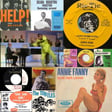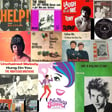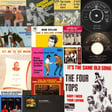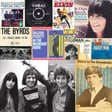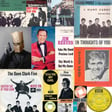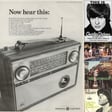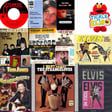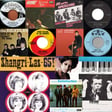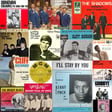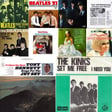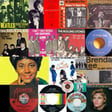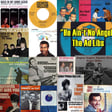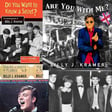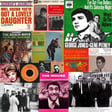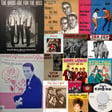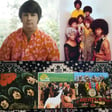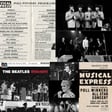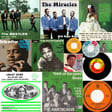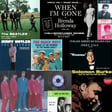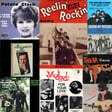Become a Creator today!Start creating today - Share your story with the world!
Start for free
00:00:00
00:00:01

February 1965 (side D)
Paul McCartney first hears of the "na na boys", and doesn't want to spoil the party! Elvis shuffles around in the sand, and the Ray Charles singers (but not THE Ray Charles) give us another of their old-timey favorites! Support this podcast at the $6/month level on patreon to get extra content! Create your podcast today! #madeonzencastr . If you are looking for Beatles summer fun, join our friends at the Magical Mystery Camp!
Recommended
Transcript
The Beatles' Catchphrase and Charm
00:00:00
Speaker
The Beatles had this charm, John Paul and George and probably then Stuart and Pete, had this charm when things weren't going well, which in their world wasn't very often because mostly it was an upward trajectory, but nonetheless, sometimes they would have a bad night or the gig didn't work properly the amps broke or whatever.
00:00:19
Speaker
i say, where are we going, fellas? And they go, to the top, Johnny. And I say, where's that, fellas? and they say, to the toppermost or the poppermost. And right. And we'd all sort Cheer up.
00:00:31
Speaker
Where are we going, Johnny? Straight to the top, boys. Oh, yeah? Where's that? The top of most of the top of most.
00:00:58
Speaker
Welcome to Side D, Toppermost of the
Podcast Introduction and 'Goldfinger' Variations
00:01:02
Speaker
Poppermost. I'm Ed Chan. I'm Kid O'Toole. And I'm Martin Quibble. So we're finishing out February 1965, and this is a Cashbox Month.
00:01:12
Speaker
Cha-cha-cha. Yeah, a rock-a-roony episode. We start the week ending February the 20th, 1965. Still at number one is You've Lost That Love and Feeling by the Righteous Brothers.
00:01:27
Speaker
At number 36 is Goldfinger. Now, as you remember, the cash box charts would group together all of the available versions of the song under one listing, under one number.
00:01:41
Speaker
So we have Goldfinger by Shirley Bassey, Billy Strange, Jack LaForge, John Barry, and Jimmy Smith. We've talked about all the other versions.
00:01:52
Speaker
We're just going to briefly talk about the Jimmy Smith version. It's instrumental. It's strange. And it's stretched across both sides the single part one and part two in the way they did at that time.
00:02:04
Speaker
And for no real reason, but The Goldfinger part more or less ends at the end of part one. It's another orchestrated, slightly jazzed version of it.
00:02:15
Speaker
Myth. Myth.
00:02:46
Speaker
Jimmy Smith is a great player. I hate to put this down, but there've been so many versions of Goldfinger and I just think this one was not necessary. Yep.
00:02:58
Speaker
If you're going to listen to any of those versions mentioned, Shirley Bassey version and the John Barry version and leave the rest alone.
Praising 'Eight Days a Week'
00:03:06
Speaker
Yep. At number 48, there's that next Beatles song, US single, but not a UK single, eight days a week.
00:03:15
Speaker
Oh, what a great single. The Brits really missed out on something, and the Beatles were actually intending at one point to put this out as a single. The fade in, great harmony, great guitar.
00:03:28
Speaker
It is Beatles' pop perfection at this point in time.
00:03:47
Speaker
You need my loving, just like I need you.
00:03:56
Speaker
This will always have a special place in my heart. This is the song that made me become a Beatles fan. yeahless Yeah, this is the song I first heard in my eighth grade chorus class in 1985. And somebody brought in the 20 Greatest Hits cassette into the room and played it. And this song came on. And yeah, I think it's that fade in.
00:04:21
Speaker
yeah I first got my attention. And then, of course, this is the definition of a hook and catching us. The harmonies and the hand claps are just so strategically placed.
00:04:36
Speaker
The pauses in the song, you know, I love you. And then Ring goes. do I mean, there just so many wonderful touches in this.
00:04:48
Speaker
And, of course, the title itself.
John Lennon's View on 'Eight Days a Week'
00:05:09
Speaker
Of course, I'm sure this will surprise no one that John Lennon thought that Eight Days a Week was one of their weaker tunes. In 1972, in an interview, he stated that we struggled to record it and struggled to make it a song.
00:05:24
Speaker
It was Paul's initial effort, but I think we both worked on it. I'm not sure, but it was lousy anyway. Of course he'd think that, but it's one of their best. This will always have a place in my heart.
00:05:36
Speaker
It's just the definition of an effective a pop single and doing things just a little bit differently.
Innovations in 'Eight Days a Week'
00:05:42
Speaker
We had some additional quotes on this, and we'll talk about that after Marv gives his opinion.
00:05:48
Speaker
That was Paul and me trying to write a song, and it didn't work out. I'm sorry, John, I don't agree with you at all. I think this is a great song.
00:05:59
Speaker
That fade in is really clever. It's completely the opposite to what you normally get with a record where you've got to fade in and an actual ending to the song.
00:06:09
Speaker
John Stone mentioned that in our feature earlier this month. Yeah. So yeah, what John said is right. You know, you've got a fade in as opposed to a fade out. And instead of it just beginning like it would on a normal record, it's got an exact ending to it.
00:06:24
Speaker
I think that's really clever. I've always thought that there was a Motown inspiration there with the rhythm of it and the hand claps and where they go that bit faster in in other sections. They have different arrangements for the hand claps.
00:06:37
Speaker
Really good. Great song. I'll never forget seeing Eight Days a Week, the movie, back when it came out.
Impact and Popularity of 'Eight Days a Week'
00:06:44
Speaker
And I saw it a theater, packed theater. downtown Chicago, and at the end, you know, when the credits were rolling, you know, eight days a week played, and the whole theater started clapping and singing along to this song.
00:06:59
Speaker
And I just remember thinking, wow, 50 years later, this song still captures the attention of audiences. That's a damn good song.
00:07:09
Speaker
The Boots and Wigs groups thank the Beatles for this song because, of course, one of their standard pieces of shtick is, hold me, yeah love me.
00:07:21
Speaker
Now do you do it. Yep. But the Beatles themselves never performed eight days a week live. That's insane. The closest they came was they mimed to it on Thank Your Lucky Stars.
00:07:34
Speaker
Mind you, how much is actually going on on this record? How many instruments are there? Is there much beyond just the four of them? No, it's just the four of them. So it's just basically what they could do live they're doing there on the record then, Kit?
00:07:48
Speaker
There's no extra there. There's just the four of them doing an instrument each? Right. As I say, all of the soundalike groups perform it as a four-piece. Just have Mal and them on the stage just to do the hand claps in front of a microphone. Get the audience to do it. Kit, kit, kit.
00:08:05
Speaker
You're doing Queen's Radio Gaga two decades early, aren't you, there? Oh, yes, that's right. Yep, just do it like Live Aid. Yep, there you go.
00:08:18
Speaker
Perfect. It wouldn't be difficult for them to do it live, would it?
Why the Beatles Didn't Perform 'Eight Days a Week' Live
00:08:22
Speaker
Well, Paul did it live, but the Beatles themselves never did it live, which is ironic because, well, with One Plus, when this was the single for One Plus, they re-edited Shea footage, so it was the video for eight days a week. Oh dear.
00:08:38
Speaker
This is what we'd like now as Beatles song. We'd like to have you join in on song with us. Will you join in on a song? Thank you.
00:08:55
Speaker
so I'm calling. That's all we'd like to do is call eight days a week. And we'd like to sing the first thing if you the word.
00:09:06
Speaker
if you don't know the word, you can sing some of the words all singing in the song. I don't care, nobody's listening to you. We'd also like you to clap your hands, but not in a random fashion.
00:09:19
Speaker
It's dead easy though, it goes, hold me, love me. me! Then the entire focus of the evening comes back to us, you see.
00:09:31
Speaker
We just carry on the way we normally do. And then more, hold me! Love me! Hold me! Love It's fun, you'll see.
00:09:43
Speaker
Everybody upstairs, hold us!
00:09:56
Speaker
I love
00:10:11
Speaker
So the origin of eight days a week, three days before they started their autumn tour of the UK.
Creation and Studio Experimentation of 'Eight Days a Week'
00:10:17
Speaker
The Beatles went into Abbey Road Studios and John and Paul had an unfinished song.
00:10:23
Speaker
This wasn't the way they would work at the time. It was usually always bring in a song, do the arrangement, record it. This was the beginning of the White Album era to a certain extent.
00:10:34
Speaker
They spent four hours on the song that day. And then after the tour, they would come back in for a nine hour session and finish it off. Wow.
00:10:45
Speaker
So two sessions over 13 hours gave us eight days a week. So this is definition of them basically working on a song in the studio. Correct.
00:10:56
Speaker
We had John telling us that She's the Woman was, the lyrics were written in the studio. In this case, the song itself was at the very least completed in the studio. I would guess John and Paul probably had that riff.
00:11:09
Speaker
Yep. It's interesting that John said that it started as a Paul idea. Yeah, well, I think he's actually offered two explanations as far as the title. Paul claimed it was a Ringo malpropism.
00:11:23
Speaker
Then he claimed it was from his then-chauffeur, I don't know if that would be Alf Bicknell. I think it was initially Paul's idea, but then he and John worked on it together. So at that point in time, they didn't know what the single would be, and they continued recording for Beatles for Sale.
00:11:41
Speaker
And what Derek Taylor told us was three different Lennon-McCartney songs were seriously being considered as the single. Babies in Black, No Reply, and then John all of a sudden popped up with I Feel
Debate on the First Beatles Single
00:11:54
Speaker
Fine.
00:11:54
Speaker
Wow. So, yeah, they were right. I Feel Fine should have been the first single, but again, Babies in Black would have been a weird single. Weird single, yeah.
00:12:05
Speaker
No Reply and Eight Days a Week, both of which could have been number one hits. Yep. Easily so. And we have our Cashbox review. Cashbox says...
00:12:16
Speaker
The famous four Liverpool lads should have no difficulty in continuing in their outrageously successful ways with this latest capital entry tabbed eight days a week.
00:12:27
Speaker
The tune is a hard-driving, rollicking pledge of romantic devotion with a contagious, repeating rockin' riff. The flip, I don't want to spoil the party is a funky country blues-ish teen angled tearjerker.
00:12:42
Speaker
Also merits a close look and we will have a close look at it a little later on. Yes. At number 51, Come Home by the Dave Clark Five. It's a Clark Smith song produced by Dave Clark. The baseline is nice, but it's really too simple to carry the tune. The lead vocal is good, but not great.
00:13:02
Speaker
And that only barely keeps the record going. The tempo picks up slightly midway through the song at the drum break, but there really isn't enough there to keep me involved.
00:13:13
Speaker
High miss, although I could see it maybe being a low meh. Only one thing I want to do Come home, oh yeah Come home Long as I know
00:13:35
Speaker
It's only one thing
00:13:53
Speaker
I did not care for this. Of course, that organ, roller rink time. i just did not like it. I don't know what that sound was. Was that a tambourine? The percussion sound.
00:14:09
Speaker
I thought it was a hi-hat. Yeah, maybe it was. Because it sort of sounded like a hi-hat to me, but I wasn't 100% sure. i thought, was that a tambourine? Was that a hi-hat? I don't know, but what like on every beat, that irritated me after a while.
00:14:22
Speaker
The harmonies were fine. Lead vocal was decent, but lyrically, just the typical, you know, come back to me and kind of track, pretty cliched stuff.
00:14:33
Speaker
Definitely not worthy of other Dave Clark Five songs. Not a highlight. Miss for me. Did you not think that the drumming was a bit ordinary for a Dave Clark 5 song?
00:14:44
Speaker
Yes. It could have used some of those big bombastic drums. Yes. It needed something to build it up. It was an experiment by Dave, Mike and the guys, but just didn't quite work for me.
00:14:57
Speaker
Yep. Boring. Thankfully, we have a better record next. At number 54, Shotgun by Junior Walker and his All-Stars.
00:15:08
Speaker
There's a winner for you. Hot lead vocal, great percussion, winning sax. I love this record. And Soul was an offshoot of Motown. I did not know that until just this moment.
00:15:21
Speaker
So that is James Jamerson. doing that amazing bass line. And by the way, when Junior Walker passed away in 1995, he insisted that Junior Shotgun Walker would be engraved on his headstone.
00:15:36
Speaker
Wow. Well, what can I say?
00:15:58
Speaker
This is the banger to end all bangers for me. I love this song.
00:16:14
Speaker
this is the banngger to end all bangers for me i love this song This is all one chord, folks. One chord. And you never get bored. The Funk Brothers are at their best.
00:16:28
Speaker
You hear jazz on this. I mean, as many of them had jazz background, and you hear it. And Junior Walker on that sax, it just doesn't get any better.
00:16:39
Speaker
It almost is like a lead guitar, the way he plays it with those solos. James Jamerson's bass, as you mentioned. There's simple rhythm guitar on there, but you know he's holding down the beat. And now those drums, that drummer is killing it.
00:16:57
Speaker
Killing it. i mean, those fills he does. I've been trying to figure out which one it was, because I thought maybe Benny Benjamin, but I'm not 100% sure, because they list a couple of other possibilities here.
00:17:10
Speaker
It is definitely not Junior Walker's normal drummer. No. It's someone from the Funk Brothers. That drummer is holding it down. It's just an incredible record. And I found this wonderful quote from Robbie Robertson, who's the band, who wrote in his biography, he he saw an early performance of the song. and he said, Junior Walker and the All-Stars were a very different Motown act. Raw, sax-blowing energy in ah a league all its own. A four-piece unit, they sounded like eight.
00:17:40
Speaker
When the guitar player fell to his knees on shotgun, Junior Walker tore the roof off the joint. I bet he did. Yeah, fantastic. I've always thought that the recordings by Junior Walker and his All Stars had a very almost stacks sound to them, closer to that the Motown.
00:17:59
Speaker
It's almost like listening to an Otis Redding song. I loved the song. It's got a really cool vibe to it, Jameson's bass. I had a discussion on a bass forum about this recently. They were on about this bass playing on this song.
00:18:13
Speaker
but They were saying, don't you get bored when you've just got this one vibe all the way through the song? This person said, and he was quite right, it's that vibe. It's almost hypnotic when you get into it, which is what Jameson's doing here, that you just keep at it, keep at it, keep at it, and it just feeds the bass player or the musician that really nice funky groove that you have going in there. If you get it, it's amazing.
00:18:36
Speaker
And then you've got the dual guitar there of Eddie Willis and Willie Woods. I still find it fascinating that Junior Walker wrote this for somebody else to do and then that singer didn't show up so Junie said well i've I'll do it then and we'll get another vocalist when he comes in he can record over that and take my vocal away so they recorded it and then Barry Gordy the boss of Motown listened to it and said no we're keeping that vocal it's perfect and he was right
00:19:09
Speaker
He really was. I mean, he just absolutely nailed the vocal. And you're so right about the groove. James Jamerson was essential to just powering this groove. I mean, there's nothing simple about it. And the lyrics, I mean, it's just naming all different kinds of dances. Sure, lyrics are nothing earth-shattering, but they don't need to be.
00:19:29
Speaker
That's not what this song is about. It's fabulous. If you want to see another great version of it, watch, and you should watch it anyway, the wonderful documentary Standing in the Shadows of Motown about the Funk Brothers.
00:19:42
Speaker
And they brought some of the remaining Funk Brothers together. And they did a version of this song, and they had Gerald LaVert come and sing lead. It is an awesome version.
00:19:54
Speaker
I said, shot gun!
00:19:58
Speaker
Shoot a bullet run knock!
00:20:03
Speaker
I said, do the day now. I said, what time is it? I said, what time is it?
00:20:14
Speaker
Come on. I said, what time is it? I said, what time is it? What time is it? What time is it? What time is it?
00:20:26
Speaker
Shotgun.
00:20:35
Speaker
I recommend the documentary anyway, but if you want to see another great version with some of the remaining Funk Brothers playing, you know stream it. More than a little bit of this bass line ended up in Drive My Car.
00:20:47
Speaker
Yep. That's true. It's definitely one of the ones that Paul would have been listening to. Mm-hmm. You bet. Motown Junkies gave this a 9 out of 10, and I would agree if not a full 10 out of 10. Yeah, I think I'd give it a 10. Yeah, I'd give it a 10.
00:21:02
Speaker
At number 59, I Feel Fine is still hanging in there. I'm so glad that she's my little girl. She's so glad she's telling all that her baby buys her things, you know.
00:21:20
Speaker
buys her diamond rings, you know. She said so.
00:21:25
Speaker
She's in love with me and I feel fine. At number 65, Stop in the Name of Love by the Supremes. Wow. We got Stop in the Name of Love. We got I Feel Fine. We've got Shotgun.
The Supremes' 'Stop in the Name of Love'
00:21:40
Speaker
We've got eight days a week.
00:21:42
Speaker
Sorry, Dave Clark, but wow. yeah Yep. That says it all.
00:22:22
Speaker
Holland Dozier Holland. This is the return to a slightly wordier song title, but really all you need is that stop. It's all there. The Hammond organ starts things out and leads into the Supreme singing.
00:22:36
Speaker
You know, you don't hear Diana Ross until the first verse. That's right. Something that a lot of people don't realize that is just the other Supreme singing before She comes in.
00:22:48
Speaker
Billboard named this song number 38 on their list of 100 greatest girl group songs, which is a little bit low to me, actually. I was going to say, that's a little low. The BBC ranked it at number 56 on the top 100 digital Motown chart.
00:23:04
Speaker
Again, that seems a little bit low. Yeah. In 2001, the 1965 recording of Stopping the Name of Love was inducted into the Grammy Hall of Fame. So another one of those.
00:23:15
Speaker
And it was at number 254 on Rolling Stone's Top 500 Greatest Songs of All Time. That might not be too out of place. I'll let you guys talk about it I want to talk a little bit about the dance moves, and we do have cash box review.
00:23:31
Speaker
This is Holland Dozier Holland firing on all cylinders. We've talked about on our show seeing them grow as songwriters. This is them. Absolutely nailing what it is to write a hit song.
00:23:45
Speaker
That title, Stop in the Name of Love, that phrase is just incredible. It's a directive. Directive, exactly. it It engages you and you remember it. And the song opens with that title phrase.
00:24:00
Speaker
And as you mentioned, Ed, how Diana Ross doesn't come in until the first verse. But boy, she just uses that kittenish, seductive tone to its best on this song. I mean, she just knows how to use the best qualities.
00:24:17
Speaker
I also love how the horns are interwoven throughout the whole song. I mean, if you listen closely, you know, you you hear them in the big moments, but you also hear them throughout. It's a very subtle arrangement. I love that.
00:24:34
Speaker
You hear the sax and other horns subtly mix and never overpowering the Supremes. And, of course, the catchy lyrics. Supposedly, Lamont Dozier came up with the idea of the song after he got cheated on by his girlfriend and they had a huge argument about it. No, no, no, no. The other way around. She caught him cheating. Oh, she caught him cheating. Okay, well, that's interesting.
00:24:58
Speaker
Well, in the heat of the argument, he said, baby, please stop in the name of love before you break my heart. Like he actually said some of those words. And then she just stared at him and then he turned back and said, think it over. That whole lyric came out of that argument, supposedly. you know, it's like one of those biopics because something happens and then you just start spitting out song lyrics. You can just say it to the musical.
00:25:25
Speaker
It does. It sounds like something out of a musical. That's insane. The Andantes, of course, are on this and Funk Brothers once again, Benny Benjamin, James Demerson, the whole lot on their playing at their best. Do we know who's doing the drumming on this?
00:25:39
Speaker
I think it's Benny Benjamin. That introduction of that five on the snare is just inspired. Yep. Oh, and by the way, Johnny Griffith is on the organ, and I love how the song starts when he does that revving up sound on the organ, making it jump right into the song. Love that.
00:26:07
Speaker
Just to come back to something that Ed said, Ed, they had to keep this song called Stop in the Name of Love because they went forward in a time machine and saw the Spice Girls do the song Stop and thought, no, we've got to call this Stop in the Name of Love so at least then we can get the great song by the Spice Girls.
00:26:28
Speaker
And some of my friends now will be listening to this and saying, Marv talked about the Spice Girls. know, I'm a little surprised. Also, that song's got some good dance moves to it as well.
00:26:42
Speaker
Yes. Yeah, we'll talk about the choreography, which is as much of the song as the song almost. That was me being tongue-in-cheek about the Spice Girls dance moves. Classic Motown, great vocals, everything's been said already, and absolute banger, 10 out of 10.
00:26:59
Speaker
yep The choreography came about because the Supremes were going to perform this song on a special hosted by Dusty Springfield.
00:27:11
Speaker
So this was the famous Ready, Say, Go, Motown special. Oh, okay. Yes. So the Supremes were rehearsing, and Paul Williams from The Temptations came up and said, why don't you stick your hand out when you go stop?
00:27:26
Speaker
Wow. So they tried it, it worked, and that choreography is now as much of the song as anything else.
Choreography Evolution with 'Stop in the Name of Love'
00:27:34
Speaker
I was doing some of it while I was listening to it. It's like you can't help yourself. Yeah.
00:27:40
Speaker
The other thing about this song, this song was done on an eight track machine. Motown had had eight track mixers since 1964. The other thing is they had upgraded the studio.
00:27:55
Speaker
The musicians were now separated by baffles and they each had a microphone dedicated because they had enough tracks to be able to do that. So Marv, why don't you read the cash box review of it?
00:28:07
Speaker
So Cashbox said about this song, it's a rousing, shuffling, pop-blues romancer about a gal, a gal. You can't get more 60s if you try. yeah really about a gal who cautions her boyfriend to go a little bit slower that should continue in the Supremes fantastic chart riding waves.
00:28:35
Speaker
Okay. And so we are going to have a super cut. There are over a hundred versions of stop in the name of love. Some of the versions include, Oh, Johnny rivers.
00:28:46
Speaker
Oh no. The Isley brothers in May of 1966. Cool. Gene Pitney. Yeah. Yeah. yeah The dreaded New Christy Menstruals in April of 1968. Oh, dear.
00:28:58
Speaker
Rare Earth. Oh, Rare Earth. Shalimar did a version of it. Nice. Pink Lady of Pink Lady and Jeff fame. Oh, wow, that's a deep cut.
00:29:11
Speaker
Leif Garrett. Oh, my goodness. Gloria Gaynor. 1983... in ninety a three Barbara Dixon, now you're going to say, where do I know that name from? That's almost a Beatles connection.
00:29:23
Speaker
You remember John Paul, George, Ringo, and Bert. Those of us who read McCartney Legacy 2 certainly remember that production. Yes. The woman who sang most of the Beatles songs in there and the woman on the soundtrack was Barbara Dixon.
00:29:38
Speaker
o Guys, if you don't know Barbara Dixon, go out there and get some listening in. She is an amazing singer. The Hollies? Wow. I don't know if we're going to include it, but Dame Edna did a cover of it.
00:29:54
Speaker
Good old Barry. but The California Raisins did a cover of it. That'll be a banger it for sure. Have we got Alvin and the Chipmunks as well? Yeah. Latoya Jackson did a cover of it.
00:30:08
Speaker
Oh, man. Kim Weston. Hmm. Wow. Human Nature and Michael DeBar. oh wow. Ooh, there's name I've not heard for a while. Yeah, I know.
00:30:19
Speaker
Not all those are going to show up in the supercut, but some of them will. I wonder if Auntie Diana was in the stage when Latoya recorded that. Maybe. I don't know.
00:30:50
Speaker
Baby, baby, I'm aware of where you go Each time you leave my door Watching you walk down the street Knowing you're other
00:31:20
Speaker
Make it over, haven't I been sweet to you?
00:31:35
Speaker
Before you break my heart. Stop in the name of love. Before you tear it apart.
00:32:00
Speaker
Oh, you think about me, baby.
00:32:20
Speaker
Well, I haven't seen her maybe once in while.
00:32:36
Speaker
Before you leave my house and rush off to his town. Haven't I been good to you?
00:32:48
Speaker
Haven't I been nice to you? Stop in the name of love. Before you break my heart.
00:32:59
Speaker
Stop in the name of love. Before you break my heart, thinking oh, oh, oh, oh
00:33:36
Speaker
My heart.
00:34:20
Speaker
Stop in the name of love Before you break heart Stop in the name of love Before you break my heart
Critique of Dean Martin's 'Send Me the Pillow You Dream On'
00:34:42
Speaker
At number 71 Come Tomorrow by Manfred Mann Which we covered on the UK side At number 74 All of the good work from the last few songs Is Undone by dean Martin With Send Me The Pillow You Dream On Oh boy Please throw that pillow in the rubbish It's past its sell by date You'll love this.
00:35:06
Speaker
Big Patriotica-like horns. I don't like those. Terrible backing singers. I don't like those. Drunk Dino. I really don't like that. And the drummer's on Coke.
00:35:21
Speaker
I'm sure you've said that just so that John's going to listen to this and go, Ed said it. Yes.
00:35:47
Speaker
That you dream
00:36:01
Speaker
This is everything I don't like about Dean Martin. Big miss. Yep. Oh, man. Well, I knew it wasn't going to be good from the very opening, that overly dramatic opening. i thought, uh-oh, turn it off. Once again, backing singers and strings, way overdone.
00:36:25
Speaker
This is a bit of drunk Dean Martin. I thought at times, like, trying to sound a bit modern, or even a little Elvis-y at times. I can see that, actually. Can you see that?
00:36:36
Speaker
And I just thought, what are you doing? And then they throw a little Fats Domino piano. So darling, I can dream on his doom.
00:36:53
Speaker
A little rock sound buried in there. You know, a little like Blueberry Hill type of playing. But, I mean, you could barely hear it. That arrangement was just so over the top. The song itself is a country song that was written originally in 1949. First recorded by Hank Lachlan, and it's since become a standard for the Nashville sound. And, mean, it's been covered by Tons and tons of people.
00:37:21
Speaker
I couldn't believe the list. Pop, country, bluegrass, so many artists. And I'm not really sure why, because I didn't really care for the song to begin with. But this version, take it off.
00:37:34
Speaker
Hmm. ah Yeah. um What's there to say? Forgettable, bad Elvis impression, with a piano that sounds more like thin playing card than Fats Domino.
00:37:50
Speaker
Where's the recycling so I can put this record where it needs to go? At number 78, If I Loved You by Chad and Jeremy. This is a Rodgers and Hammerstein song. It's a song from Carousel.
00:38:02
Speaker
It's not a bad version. There's nice harmonies from Chad and Jeremy. But the big Broadway arrangement doesn't really suit them.
00:38:18
Speaker
I want you to know if i loved you words wouldn't come in an easy way
00:38:42
Speaker
The song was performed in the 1956 film version of Carousel by Gordon McRae and Shirley Jones. And there were four hit versions of the song in 1945. Perry Como, Frank Sinatra, Bing Crosby, and Harry James.
00:38:55
Speaker
Our old friend Bob Goulet shows up again because he sang this song in a... TV version of Carousel in 1967. This would not be a hit in the US or the UK, but it would reach number 16 on Canada's RPM charts.
00:39:12
Speaker
Oh, wow. Well done, Canadians. Yes. Yeah, I agree. i did not think this was a good match for them. Chad and Jeremy sang it fine. I would have liked them little more if there harmonies.
00:39:27
Speaker
But yeah, that bombastic arrangement, that Broadway arrangement, was too much for them. They're at their best when they have more pared-back arrangements.
00:39:38
Speaker
Their voices are almost delicate And I thought they got lost at times in this. The strings, orchestration, drums, I mean, almost drowned out their voices at times. I thought this wasn't the best recording either. And this just was not a great fit overall for for their voices.
00:39:57
Speaker
Wow. Me and Kit in sync. Mm-hmm. Nice vocals with a song that doesn't match them at all. And quite frankly, the only good versions of this song are the versions from productions of Carousel. Other than that, Leave Well Alone.
00:40:16
Speaker
I don't like the Bob Goulet version. The Shirley Jones version is good. Yes. Shirley Jones is great. Yes. When it comes to musicals, though, you know, you can give anything to Shirley Jones. It'll sound great.
00:40:27
Speaker
Yeah. At number 80, Good Times by Jerry Butler. It's a VJ record. Good lead vocal, strong backing, good but not great song. The pieces fit and are pleasant enough together, but the song never really takes off.
00:40:41
Speaker
A low to middle hit. That's funny. That's exactly what I said, that I was waiting for some kind of crescendo or something, but nothing really happened. It just doesn't really go anywhere. But I do like Jerry Butler's voice on this. I mean, of course, it's Jerry Butler, just an amazing voice.
00:40:57
Speaker
I thought the mixing and recording could have been a bit better on this. For example, some instruments, like I think there were vibes on this that seemed louder. There just seems to be some imbalance there.
00:41:08
Speaker
Other than Jerry's incredible voice, I don't know if I would listen to this again. It just wasn't that distinct of a song for me. Oh, I can't afford to take you places
00:41:37
Speaker
It's far too
00:41:51
Speaker
none of the instrumentation jumps out except for the vibro phoneam that's far too ahead in front of everything else. Yes. Other than that, songwriting-wise, nothing that jumps out. There's no hook in there at all that pulls you in.
00:42:06
Speaker
I'll probably give this maybe two and a half to a three for Jerry's voice alone. Yep, I agree. Have we mentioned that Jerry Butler was actually in the original Impressions? The act was actually known as Jerry Butler and the Impressions.
00:42:21
Speaker
Yes. Curtis did not care for that, so... no no At number 90, I Must Be Seeing Things by Gene Pitney, which we covered on the UK side. At number 93, If I Ruled the World by Tony Bennett.
00:42:35
Speaker
The song from Pickwick, tremendous lead vocal. I like the Ralph Sharon piano. It was arranged by Don Costa. It's a good version, but... It's still a little bit too Broadway for my taste. It's better than the Seacom version.
00:42:50
Speaker
Tony Bennett is a much better singer than Harry Seacom, but it's still not great. Tony Bennett has done much better versions of this song. The one that a lot of people remember is the one he did on duets with Celine Dion.
00:43:05
Speaker
But the one I have a soft spot for is from the Party at the Palace performance in 2002. for the Queen's Jubilee, the same one where Paul did Her Majesty.
00:43:17
Speaker
Yeah, I would say his live versions of this are much better than the recorded version because much like some of his other recordings we've heard, they tend to be in this period overranged, which is amazing because, know, Don Costa was a top arranger.
00:43:34
Speaker
And Ralph Sharon was just one of the most incredible jazz pianists you could ever hear. And you can barely hear him in the recorded version of this.
00:43:46
Speaker
but I got to see him perform this song live. It's just so much better because, you know, I saw him performing with trios. And so it was sort of like on MTV Unplugged, you know, when it was stripped back.
00:44:00
Speaker
Because this song is so beautiful. I love the lyrics. It's so moving. And Tony, as I mentioned earlier, was just a master phraser, master interpreter.
00:44:14
Speaker
And he would consider every word. And another version that was nice that Ed, you linked us to, was one that he did on Ed Sullivan. And that was wonderful, too. Because you could see him considering every word, almost acting every phrase. And it just is a wonder. Thank you.
00:44:53
Speaker
If I ruled the world
00:45:27
Speaker
If I ruled the world,
00:45:33
Speaker
every man would be as free as a bird.
00:45:40
Speaker
So I would say find live recordings of this. I'd say skip the studio version and you'll really get to experience how beautiful this song is and and what a master vocalist he was.
00:45:53
Speaker
Yep. I love Tony's voice on this. I love Tony's voice on every version of this song that he does. The musical backing, possibly over the top. yeah But I like this. And I'm now going to surprise my colleagues here and say this is getting a bonus supercut.
00:46:11
Speaker
Oh, okay. In the Patreon version. And you will hear versions that include Bobby Darin, Sammy Davis Jr., Nancy Wilson. We've also got James Brown and the Famous Flames. For people in the UK, I've got Bruce Forsyth, Stevie Wonder, Dionne Warwick, Jamie Cullum, and maybe some more in there. Who knows?
00:46:35
Speaker
Very nice. And Cashbox told us that Ruled, by the way, is getting network TV exposure on the Alcoa program. So good to know 60 years later.
00:46:46
Speaker
You know, if this was Cashbox 2025, the review would just this song Ruled. Yes. this song ruled ah check
00:46:56
Speaker
At number 95, Pass Me By by Peggy Lee, another film that none of us remember. This was the main theme from the motion picture, Father Goose. Oh, I do remember that film.
00:47:09
Speaker
Oh, do you? Oh, really? Okay. Cary Grant and I'm trying to remember the woman was. Cary Grant, Leslie Carroll. Is it morning already? And Father Goose, co-starring Trevor Howard.
00:47:23
Speaker
Good heavens, he's killed her. and the dear little girls
00:47:34
Speaker
A World War II film, Cary Grant played the lead. It has quite possibly the most cliche tagline ever. Romantic sparks fly between the prim schoolmistress and the slovenly loner.
00:47:47
Speaker
Who is the schoolmistress? I'm going to slap myself if I don't remember. I know who it is. i don't know if you want me to tell you. Please. Leslie Caron. Yes.
00:47:59
Speaker
Yes. Yep. And Ed, don't avoid the film. It's hilariously funny. Okay. It's really good. Now as to the song. Lots of idle fingers
00:48:13
Speaker
snap to my command.
00:48:25
Speaker
It's somewhere between a military march and 76 trombones. Yeah. It might as well be the theme for Gomer Pyle USMC.
00:48:45
Speaker
it's somewhere between a military march and seventy six trombones yeah it might as well be the theme for gomerpile usmc ah The contrast of a, quote, sexy, unquote, girl singing Ten Toes to Wiggle in the Sand?
00:49:01
Speaker
And the show-busy military thing just doesn't work. Miss. Yeah, and I hated to say this because love Peggy Lee. I mean, she's she's fantastic. But yeah, I didn't think this song was terribly well-suited for her. like it better toward the end when it starts moving a little away from the military march.
00:49:22
Speaker
It starts swinging a bit. I got me ten fine toes to wiggle in the sand Lots of idle fingers snapped to my command A lovely pair of heels, a kick to beat the band Contemplating, nature can be fascinating I just wasn't crazy about it. Interestingly, the person who did the big band arrangement on this was Dave Gruson, big name in television and film. and He founded a label that was big and smooth jazz in the 70s, 80s and 90s.
00:49:59
Speaker
Dave Gruson's soundtrack for director Robert Redfoot's The Logwell-Beanfield War has been nominated for an Academy Award. Four others of his more than 30 movie scores have earned Oscar nominations.
00:50:12
Speaker
And you wanted to be a veterinarian, is it? Yeah, I did. i at one time, I thought that's what i was going to do Or raise cows or something.
00:50:36
Speaker
But Dave Grusin has cultivated contemporary jazz instead. Not just as a composer and musician, but as a record company executive. Grusin is the G in GRP Records, his own independent jazz label.
00:50:50
Speaker
But anyway, it's okay. Peggy Lee has done much, much better than this. What are they doing giving this song to Peggy? It's a travesty to give her this song.
00:51:01
Speaker
But this is the fever lady for crying out loud. Exactly. When it gets towards the end and it gets a bit more swing in it, if it had been like that way all the way through, and I'm not going to tell you that that would have made it a banger because it would not.
00:51:15
Speaker
No. But it would have made it bearable to have just gone through and gone, yeah, it's all right. I'll never have to listen to the song again. Exactly. The way that it is, it's more of a, oh, I wish I'd never listened to the thing in the first place.
00:51:30
Speaker
Exactly. Yeah, the swing teer would have made it bearable. yeah And we do have a couple of Beatles connections between Peggy Lee and various Beatles.
00:51:41
Speaker
First off, in the next to final season of the Ed Sullivan Show, Ed Sullivan did a tribute to the Beatles because, of course, Let It Be was coming out.
00:51:52
Speaker
March the 1st, 1970, amongst the performances from other people, they spliced together Dionne Warwick, Peggy Lee, and Paul's 1965 performance in a very odd...
00:52:05
Speaker
medley of the three of them singing it so you can look for that
00:52:12
Speaker
you know one of the most beautiful and best-known people songs yesterday was first performed in america by paul mccartney and joining him tonight here is diane warwick and peggy lee
00:52:36
Speaker
Yesterday, all my troubles seem so far away. God looks as though they're here to stay.
00:52:48
Speaker
Oh, I believe in yesterday. Suddenly, I'm not half the man I used to be.
00:53:31
Speaker
And then the story which we are now overly familiar with, Paul claims that he was invited to a party by Peggy Lee and, well, I could bring around a bottle of champagne or I could bring around a song.
00:53:46
Speaker
Thank you, Sam Wiles. And as we now know that's all a lot of hooey. this But it did result in a recording, though. So Let's Love is out there. We have both the McCartney version in One Hand Clapping and we have two versions from Peggy Lee.
00:54:03
Speaker
Yes. And then John would refer to her as Peggy Legg.
00:54:11
Speaker
Oh, I'm sorry. I do think that's funny.
00:54:17
Speaker
At number 96, I've been trying by the impressions. This is the flip of people get ready. All I have to say is, has there ever been a more Curtis Mayfield song than this?
00:54:29
Speaker
Good lead vocal, great harmony, but it really isn't much more than an interesting B-side. Low hit. Yeah, I wasn't crazy about this. I thought this had promise. Lord knows that I've been trying to understand why.
00:54:53
Speaker
Can I be your only man?
00:55:00
Speaker
Keep on trying.
00:55:13
Speaker
it It needed a little more work lyrically, and I would have loved a little more harmonies. Like, I loved the woos at the end. There were some beautiful harmonies from the Impressions.
00:55:24
Speaker
I liked Curtis's vocals. I know there were some other vocals there. I loved his vocals. Didn't love the percussion on this. think those were bongos. I would have loved a little more...
00:55:35
Speaker
than that. I mean, nothing too heavy, of course, but the bongos kind of, they got a little old after a while, and it just didn't have a structure like some of their other great songs, like It's Alright, or some of their other strong material.
00:55:51
Speaker
Nice chord changes, you know, because that's but because that's Chris Mayfield, he's the king of those wonderful jazz tinge chord changes. But I just thought the song had some promise, but it needed some more rewriting.
00:56:05
Speaker
Do you know who was doing the lower vocal? No, I was trying to figure that out too. I don't. Because I liked their voice and it was different. It's weird to have the impressions where these people taking turns.
00:56:18
Speaker
That was just weird in a way. It works as a B-side. yeah And it's almost like Curtis is experimenting with production on this because of the fact that he knows it's a B-side.
00:56:31
Speaker
So it's not working properly, but he's experimenting with the percussion side of it, like he said, the bongos and things like that, and making his way towards what he'll end up doing in the 70s when he gets things like Superfly with a percussion style.
00:56:45
Speaker
Yeah, that's a good point. Even though it's written by Curtis, it's not the first version of this song. Hmm. Because his buddy, Jerry Butler, released it four months previously.
00:56:56
Speaker
And Curtis is on that as well. Oh, okay. At number 100, I Can't Explain by the Who, which we covered on the UK side. We move on to the final week of February on the cash box charts.
00:57:09
Speaker
Over on the Billboard charts this week, 4 by the Beatles did chart, by the way, not on the cash box charts. So at number one, This Diamond Ring by Gary Lewis, which we talked about last month.
00:57:21
Speaker
All the way up to number five is eight days a week. That was fast.
00:57:55
Speaker
At number 20 is Fairy Cross the Mersey, which we covered on the UK side. At number 47, two vocal versions of Red Roses for a Blue Lady by Vic Dana and Wayne Newton.
00:58:08
Speaker
The Vic Dana version, croon, croon, croon, stripper backing. stripper backing. Terrible screechy background vocals. The tune manages to appear just enough to keep the record listenable.
00:58:29
Speaker
She had a silly quarrel.
00:58:45
Speaker
want some rain.
00:58:56
Speaker
The Wayne Newton version is not as good as the Vic Dana version.
00:59:18
Speaker
We had
00:59:32
Speaker
That's about all I have to say. Although I will say the appearance 23-year-old Wayne Newton is unintentionally hilarious. Okay, Vic Dana first.
00:59:43
Speaker
The stripper backing. I was trying to figure it out. Is it musical? Is it vaudeville? I guess I was thinking more of the G-rated version, but yeah, maybe stripper would be a better description.
00:59:55
Speaker
I mean, that trumpet solo in particular, there was something kind of sleazy about it. It was just so weird.
01:00:11
Speaker
And I said I could almost visualize this version being played at drunk singalongs at taverns, particularly toward the end. Didn't do it for me. Even though, as you said, the Vic Dana version, yeah, he's definitely a crooner. Which was a weird juxtaposition. Like, here's this backing and he's singing it in this very croony, smooth kind of way.
01:00:33
Speaker
As far as Wayne Newton goes, it was a little... Smoother than that. I mean, it wasn't quite the drunk sing-along backing kind of you know quality.
01:00:44
Speaker
More muted trumpet, smoother vocal and backing singers. Not quite that sing-along quality. I think he was going for a more you know dreamy sort of thing, but definitely didn't work.
01:00:57
Speaker
And yes, hearing a young Wayne Newton is very interesting. Not just hearing the picture of a young Wayne Newton. And the picture too, yes. Fascinating. I can't beat what Ed said about the version of Vic Dana.
01:01:07
Speaker
I'm not even going to go with that song now because I can't beat that. and Wayne Newton though. Oh my God. Wayne Newton was a kid once. we didn't He was.
01:01:21
Speaker
Cashbox reviewed both of these. What they tell us is they're two excellent up-tempo shuffle offerings. The hushed voice Dalton stand by Vic Dana with Ernie Freeman's Ork. There's our Ork. Oh, R-K.
01:01:35
Speaker
Orc Coral outfit in top support and Wayne Newton's charming stylings on Capitol with Dick West's crew in superb, again, Orc Coral's form. Yeah, Mork's calling Morkson again.
01:01:47
Speaker
yeah Dana has a tantalizing Rock-A-Twist pounder on his coupler produced by Dick Glasser. Newton has a tender ballad Lilter on the other end of his.
01:01:58
Speaker
Round of applause for Rock-A-Twist. Yeah, Rocket Twist? Did I miss something? ah Now, we will say this will not stop us from reading Cashbox reviews, but Marv has been hinting at it for the last couple months.
01:02:14
Speaker
Yeah, there was a little bit of payola involved at Cashbox. No! Okay. No way! Don't say. December 12th, 1992, Whitney Houston's I Will Always Love You spent its third week topping the Hot 100, but the number one song on the Cashbox chart was The Letter by Wayne Newton.
01:02:36
Speaker
Wayne Newton? Dear me. Yes, that Wayne Newton. The Letter failed to chart on the Hot 100, or indeed any Billboard singles chart. How a long-fated Vegas Stable's easy-listing tribute to Elvis reached the top of America's second-most pop chart remains a mystery to this day.
01:02:56
Speaker
Suffice to say, Cashbox lost all credibility nearly overnight, and the magazine would be out of business by the end of 1996.
01:03:04
Speaker
A few years later, a former Cashbox employee would be charged and convicted of murdering co-worker in 1989,
01:03:12
Speaker
For refusing to take part in an unrelated payola scheme related to the reviews in Cashbox. I can't believe that I picked up on that and thought of that.
01:03:24
Speaker
Good call, Merv. At number 69, Do the Clam by Elvis Presley. Yep. We've got a song that's worse than the last one. Yep. Poor old Elvis.
01:03:34
Speaker
The song was written by Sid Wayne. Ben Weissman and Dolores Fuller. Dreadful. Pointless bongos. And a wacky sex solo by the man himself, Bruce Randolph, who we mentioned earlier.
01:03:46
Speaker
Big miss. Yachty sex.
01:04:38
Speaker
We actually remember Girl Crazy, but the film is worse than the song. Elvis hated both, and that is reflected in the quality of both the film and the song. I love him badly miming playing an acoustic guitar while ah an electric is blaring out of the soundtrack. yeah The dance sequence is just plain uncomfortable.
01:05:00
Speaker
And most people say it shows you how Elvis forgot how to dance over the course of eight years. Yes. And then you got this thing where you can do little more than just shuffle left and right like Charlie Chaplin. Yes. Oh my gosh. I mean, it was terrible.
01:05:17
Speaker
When I saw the clip, I was like, what happened? Elvis can dance. Yeah. It is such an embarrassing song. It's not even a good dance song. Cheesy lyrics, generic backing track, doesn't even showcase Elvis vocally. It's just a miss all around. just felt embarrassed for him.
01:05:35
Speaker
I mean, he didn't deserve this. Colonel Tom Parker, man, it's just terrible what he did to him making him be in these movies and record this garbage. or Just terrible.
01:05:47
Speaker
Did you listen to the mono or the stereo mix to this? The mono. Yeah. You did. There is a stereo mix to this that is dreadful. Really? Okay, so it's worse. Yeah. The stereo mix, you've got drums on one side and guitars on another, and so you've got all the instruments to one side or something, know, different side. It's not very good mix.
01:06:08
Speaker
Hey, everybody, gather round. Listen to that bongo sound.
01:06:15
Speaker
the mono mix is better but and trust me when i say this you don't have to go out of your way to listen to it this song is not good and anyone who tells you otherwise needs a clam to pinch them and say to them don't be stupid And get this, one of the co-writers, it took three people to write this song.
01:06:40
Speaker
Okay, so that's the first shocker. Second is, one of the co-writers was Dolores Fuller, who is a songwriter and actress, and one of her best-known roles is she played the role as the title character's girlfriend in Ed Wood's Glenn or Glenda.
01:06:58
Speaker
a and A classic? Yes. How about that? If this were April, we would have had a bonus supercut of this track because there is only one version of it.
01:07:16
Speaker
I'm shocked. well No, no we're we we can't do that because this is not April. Okay. If it was April 4th, we'd record our own cover version of it.
01:07:26
Speaker
Yeah, no kidding. But that took three people to write this? Three. All they needed to do was go to the outhouse. That's right. you You want some billyard? Is that what you're looking for? Aunt Jenny and billyard again?
01:07:44
Speaker
Call back. At number 76, Nowhere to Run by Martha Reeves and the Vandellas.
Martha Reeves and the Vandellas' Comeback
01:07:51
Speaker
A Holland Dozier Holland song, a Whitfield production, a really great record, a nice comeback for Martha Reeves the Vandellas.
01:08:00
Speaker
Dancing in the Streets now really feels like it's fairly far in the past, although it's you know not even a year ago. But this is a great record. An amazing pain lead vocal. And once again, the Funk Brothers.
01:08:13
Speaker
On a special note, we spoke of in Dancing in the Street how they pulled out a tire iron for the extra percussion. Here, they pulled out some snow chains. yeah So that percussion is snow chains being ah slammed on the floor, reportedly until Ivy Joe Hunter's hands were bleeding.
01:08:34
Speaker
Wow. did do did ah did Did they get Jacob Marley to pull those chains? Yeah. It is described as being the sound of a thousand tambourines in the background.
01:08:46
Speaker
Wow. oh i I love this track. This is another absolute masterpiece from Motown. i mean, that Martha Reeves' lead vocals on this are just so fierce.
01:09:02
Speaker
i i I love her performance. um Again, Howland-Dozier Howland, doser howland are are i mean, they're just on fire. at at this point. um And, you know, telling the story of, you know, a woman trapped in this terrible, you know, this bad relationship with a man she can't help but love.
01:09:21
Speaker
And yet, you know, as I said, Martha's fiery vocals ah really, you know, give a song which, you know, that could have been kind of a touchy subject, but she really sounds still so so fiery. I mean, she definitely doesn't sound like a you know ah victim.
01:09:41
Speaker
And as as you mentioned, Ed, the hard driving instrument instrumentation on this, I mean, from those snow chains, is snow chains um to just, the of course, the Funk Brothers at their best here. I mean, we have Benny Benjamin on drums. I mean, the drums are so important on this.
01:10:01
Speaker
um James Jamerson on that driving bass. Earl Van Dyke on piano, another ah important member of the Funk Brothers. And I should also mention one of the other members on tenor sax is Henry Cosby, who would later go on to play a very important role in Stevie Wonder's career. I mean, he was basically his mentor and teacher um throughout his time at that early years at Motown. Love this track.
01:10:32
Speaker
it's It's just, I think it's as good as Dancing in the Streets. Agreed. Yep. Yep. A solid Motown classic, wonderfully written, catchy all heck, with great vocals, instrumentation that's absolutely top quality.
01:10:48
Speaker
And we've got another 10 out of 10. Yes. On this one. Yeah. Kit, you want to read the Cashbox review? And then I've got a little thought exercise for us. So Cashbox said, the action side is a hard-driving, fast-moving, raunchy blue stomper with a contagious teen-oriented, danceable beat.
01:11:09
Speaker
Teen-oriented, danceable beat. Again, we can start to see their template for these reviews. My thought exercise, do you think that the Supremes and the Vandellas are almost developing a Beatles-Stones thing?
01:11:23
Speaker
You know, you got one that's a little bit more hardcore, blues and R&B, and the other is a little bit poppier, but they're both doing very similar things, both building off of the same blocks.
01:11:34
Speaker
They're both excellent, they're both popular, and then ultimately only one of them would win this battle for supremacy. That's an interesting thought. I never really thought of it that way. Martha Reeves and the Vandellas, you know unlike the Soans, they were painted as the bad boys. I mean, they weren't bad girls, but... A little bit, though. I mean, certainly as opposed to the Supremes, the Supremes were very much the squeaky clean Beatles of Motown. Yeah, but definitely Martha Reeves and Vindel's, I think they did have a little bit of a, I hate to say, harder sound. but It wasn't exactly. But I guess they did have a bit more of a deeper soul sound. And certainly Martha Reeves' voice was not the kind of kittenish, flirty sound that Dinah Ross had, ah least at this point in the Supreme's career. i mean, Martha had, as I said, that sassier, more independent delivery than Dinah Ross had.
01:12:27
Speaker
What's your niche? We think the Supreme sound was a little more prettier than our sound. We were, i think we were considered the more rougher sounding group.
01:12:40
Speaker
And i think that was because the lead singer that we had when we were the Delphi's, like I said, she made us sing everything. So we were used to singing. all kinds of genres of music, you know, but if it was kind of soft and sweet, then they sort of gave that to the Supremes. If it was a little bit rougher, then they would kind of give it to the Vandellas.
01:13:03
Speaker
It's almost like you've got the smoother side of the Supremes and the slightly edgier, more social conscience side of the Vandellas.
01:13:14
Speaker
he Yeah, that's just something I thought of. And it's like, yeah, I'll bring that up. I can sort of see where you're coming from with that. Because it does look like they could almost work it that way from this point onwards.
01:13:24
Speaker
And I think they do actually do that quite a lot from now onwards, don't they? I think they do go that way. Yeah. I can't picture the Supremes doing Dancing in the Street. I mean, they could do it, but it wouldn't have the same fierce call to arms quality.
01:13:39
Speaker
No way. As opposed to, I think the Beatles could do just about anything the Stones did if they really wanted to put their minds to it, honestly. At number 84, Go Now, which we covered on the UK side.
01:13:51
Speaker
At number 88, The Flip of Eight Days a Week, I Don't Want to Spoil the Party by the Beatles. It's a Beatles album track, which makes it better than just about everybody else's singles. No.
01:14:13
Speaker
I don't want to spoil the party, so I'll go. would hate my disappointment to show. There's nothing for me here, so I will disappear.
01:14:28
Speaker
If she turns up while I'm gone, please let me know. This really could have just been an accent song on Beatles for sale. One for them to experiment on.
01:14:39
Speaker
But what we get is a record which ultimately teases the future that is Rubber Soul. It's the debut of George's Gresh Tennessean. You've got, once again, that amazing Lennon strum and the perfect use of the harmony track.
01:14:54
Speaker
I'm still not sure. Is that Paul or is that John double tracking himself on that low harmony? The break is a little bit Dylan, a lot of Carl Perkins, country rock before the birds.
01:15:05
Speaker
No.
01:15:27
Speaker
Though tonight she's made me sad. I think this is one of the underrated ah songs of the Beatles. I love the harmonies. And then, yeah, that country rock sound. I don't know if we've talked about it a lot on this show yet, but they definitely were country fans. They were shaped by Carl Perkins. I mean, rockabilly, which is is a huge debt to country.
01:15:52
Speaker
So here's, they're taking their turn at writing a country kind of song, and I think doing a pretty darn good job of it. Now, supposedly, this was originally meant for Ringo.
01:16:03
Speaker
could that. Yeah, and I could see that too. But I don't know if maybe they decided that was maybe a little too difficult for him to sing. I don't know. It's a bit rangy.
01:16:14
Speaker
Yeah, it may have been a little rangy. Nobody has said exactly why it ended up with John taking the lead, but It's just a real highlight of Beatles for Sale and great, as I said, underrated song. I do love this song. It's a song that I always love listening to. Beatles Sale is an album that like a lot anyway. But it's interesting that Ed said about this almost hinting at where they would go with Rubber Soul because I think both the sides actually do that to a degree.
01:16:41
Speaker
Eight Days a Week is like a mix of the folk with the acoustic strumming guitars and the Motown-esque there and then a little bit of rock in there as well and this one you've got the country rock in there as well so it's almost showing all of the different feels that you'll get going forward into the british version at least of rubber soul And as we had mentioned, what Cashbox said was this was a funky country blues-ish teen-angled tearjerker.
01:17:16
Speaker
which I don't think they got paid for that review. so Some gorgeous bass playing on that by Paul, by the way. On I Don't Want to Spore the Party. Where he's doing the octaves there and then throwing in the fifths on bass at points. That's really clever.
01:17:32
Speaker
At number 89, Stranger in Town by Del Shannon. Del Shannon returning to the well. Another rewrite of Runaway, but here we've got a sax solo replacing the organ, and I don't quite understand these lyrics.
01:17:45
Speaker
I'm not afraid of what they'll do to me I'm just afraid they'll hurt my baby
01:17:58
Speaker
We don't care if we run for baby Just dance more
01:18:25
Speaker
Are the man and his girl being chased for being together? Me and my baby been on the run so very long. Her folks sent a man to get us. They say we've done wrong.
01:18:36
Speaker
Is it maybe an interracial thing? or um' I don't know. Yeah, I was a bit at a loss, too. What are they running from? I'm not sure either. As you said, definitely sounds reminiscent of Runaway. The reverb on the drums also sounds Phil Spector-esque, I think, trying to, shall we say, emulate the wall of sound.
01:18:57
Speaker
It has a bit of a haunting quality in terms of the minor chords, trying to also emulate keep searching in various parts, but not nearly as strong as runway or keep searching.
01:19:10
Speaker
wow ah well It's like a song that's used bits from Keep Searching and Runaway, copy and paste, and it's got lyrics that are make-do lyrics that have not been completed because they have no through line that works.
01:19:31
Speaker
coherently throughout and so it's what happens when you write a song in haste basically you've written it so quickly you've ended up with something that lower rate and you should have spent a heck of a lot more time on the song really because it's just doesn't work because it doesn't cohesively say anything throughout the song There you go.
01:19:57
Speaker
at number 90, It's Gonna Be Alright by Maxine Brown. A Goffin' King song. Surprise, surprise, Carole King is writing about infidelity in the early 1960s.
01:20:08
Speaker
Where'd she get that idea? Nice guitar, ah cool soul feel, a good if not great lead vocal. It gets better though as it really soars at the end for the last few It's Gonna Be Alright.
01:20:20
Speaker
I don't care for the backing though. The strings and horns are fine but none of it really meshes. I agree. Not a terribly remarkable song. And I know it's gonna be alright.
01:20:33
Speaker
Watch out my name now. It's gonna be alright. You came and led me out of the darkness and into the light. And know, baby, it's gonna be alright.
01:20:54
Speaker
the are Interesting for two reasons. First of all, Maxine Brown's voice. She was great singer, smooth as silk.
01:21:06
Speaker
Even worth it just to hear her incredible voice. But also, some of the chord changes in this kind of are a preview of some of the changes Carole King would use on Tapestry. I mean, there were few that I thought, oh, that sounds a little, you've got a friend-ish.
01:21:23
Speaker
to me. And so there were just some parts of this that I just thought, wow, this is a little foreshadowing of some of those chords that would dominate on tapestry. So little bit of a preview of what she would use. But other than those two things, not a standout Goffin and King composition or arrangement.
01:21:46
Speaker
Yep. I felt that there was more than a touch of similarity to the previous hit, Oh No, Not My Baby. Just a little bit. I can see where it shows where they will go in the future with the songwriting, definitely for Carole King. I loved Maxine Brown's voice, but other than that, just didn't hold my attention much.
01:22:08
Speaker
Yep. ah Agreed. At number 92, From All Over the World by Jan and Dean. Jan and Dean were the emcees for the two Tammy shows, which would eventually be edited together into the Tammy show film. This theme song, oh boy, it sounds like what it is. It sounds like a theme song. They're borrowing their own little old lady from Pasadena.
01:22:33
Speaker
They mention stars of the day. They get in an I get around drop. This singin'
01:22:47
Speaker
And the lyrics. From Liverpool to Tennessee, Chuck Berry's checking in from St. Lou. He's going to sing Maybelline and Memphis, too. The representative from New York City is Leslie Gore. Now she sure looks pretty.
01:23:02
Speaker
Hey! and And it gets better. a Those bad-looking guys with the moppy long hair, the Rolling Stones from Liverpool, are bound to be there. Hey!
01:23:16
Speaker
Those bad-looking guys put the hockey law here. The Rolling Stones and Liverpool have gotta be there. The Gary and the Pays make a pretty day too. They're all gonna be there to sing for you.
01:23:28
Speaker
Here they come.
01:23:33
Speaker
Jerry and the pacemakers, Billy J too. They're all going to be here to sing for you. Do you think they thought they were going to get the Beatles and and they wrote this as the Beatles? And then when they got the stones and said, well, no one will notice.
01:23:46
Speaker
Right. We'll just interchange the name. It'll be fine. Exactly. There's only about 300 miles difference between the two. You take out bad looking, it's those guys with the moppy long hair, the Beatles from Liverpool. That makes more sense. Exactly.
01:24:01
Speaker
I love it. Oh, Liverpool, London, it's all the same. No problem. It's all the same, yeah.
01:24:07
Speaker
Needless to say, miss. It's a TV theme song, all right. It certainly is. Ending certainly still sound like the surf band they are, but with more showbiz courtesy of the horns.
01:24:21
Speaker
Don't really know why this would be released as a single other than the novelty value. Other than that, really not much more to say other than take it off. Yep.
01:24:31
Speaker
A nothing song. Can't think of anything decent to write. So rip off their friends, the Beach Boys and their own songs and other people's songs. to Throw them in there to make the song sound at a heck of a lot better than it actually is.
01:24:44
Speaker
yep Well, the Tammy Show film was out December the 29th, so it was probably just hitting most theaters about this time. So, you know, people would be familiar with the tune. It's like, okay, that's probably why they released it as a single.
01:24:56
Speaker
You shouldn't have. Thanks. At number 93, a song which may or may not be better than the Jan and Dean song. This is My Prayer by, not Ray Charles, but the Ray Charles Singers.
01:25:08
Speaker
Not good. Sleep inducing. Sleep inducing.
01:25:33
Speaker
How do these guys keep charting? Male and female singers, organ backing, and just a tiny little bit of guitar at the end. Take it off. Miss. Miss. Yep.
01:25:43
Speaker
As I was listening to this, I just started going, this is elevator music. This my prayer. This is my prayer.
01:25:58
Speaker
The organ, neil as you mentioned, playing a very annoying rhythmic chord over and over and over again. That just drove me crazy.
01:26:08
Speaker
And i love the title of the album that this is from, Songs for Lonesome Lovers. You want to fall asleep.
01:26:19
Speaker
Exactly. Well, you'll be lonesome if you slap this on. It's definitely not a Barry White album. No, definitely not. Yeah, if you want to put your lover to sleep, slap this song on.
01:26:32
Speaker
Miss. Barry White is if you don't want them to fall asleep. That's right. From start to finish, it felt like a punishment. The sort of song that you could play on ah stereo in a hospital and not need to use anything to put anyone to sleep because this song will do it for them.
01:26:51
Speaker
That's right. You could save a fortune on anesthesia by putting this record on in operating theaters. At number 95, a record which confuses me. Baby I'm Sorry by The Three Degrees. It was on Swan.com.
01:27:07
Speaker
It's a fairly tuneless offering, mediocre to poor girl group style song with an uninspiring lead vocal. It's hard to believe that this is the same group that would eventually make a splash with Philly Soul.
01:27:21
Speaker
Now, some of the members would be different. The other thing that's hard for me to believe... Yes.
01:27:30
Speaker
the late fayette pinney it's about sixty three last year in high school and it was fun okay i can believe that sure they were discovered by producer and songwriter ritchie barrett who produced the original lineup on their first song gbaby i'm sorry for swan records in nineteen sixty
01:28:15
Speaker
Richie Barrett wrote this song? How? Why? The same man who co-wrote Some Other Guy wrote this. Yes, that's right. Yikes. And the band would go on to be well-known in Philly solo and work with Our friends on the Philly soul side.
01:28:32
Speaker
Yep. How is this the same girl group who would do the incredible When Will I See You Again? Not the same members, because after this came out, original members Shirley Porter and Linda Turner, who were on this song, would leave.
01:28:50
Speaker
So okay in a way, it was a very different group by the seventy s yeah I was shocked when I saw this song on the charts and I thought, we've got to cover this because i didn't know the Three Degrees went back this far.
01:29:02
Speaker
No. But wow, what a very different sound than When Will I See You Again Three Degrees. This is definitely not a standout song to say the least.
01:29:13
Speaker
I guess cutting them some slack because this was early in the Three Degrees career. They were sounding a bit unpolished at this point in their harmonies, but very uninspired lyrics. And that's not the worst of it. The tune is just not a tune. No, it really isn't. And they're trying kind of a typical doo-wop sound of 50s and early 60s, but it just goes nowhere.
01:29:36
Speaker
Not a great recording. I mean, just all way around. No, not a wonderful beginning to the three degrees. Thank goodness it got better. Now, as much as it's got Ritchie Barrett...
01:29:48
Speaker
behind this it's a shame that they hadn't already met gamble and huff at this point and it would take so many years until they would Exactly. Well, the Gamble and Huff songs we've had are not so inspiring at this point either. Yeah, they were still learning their craft.
01:30:03
Speaker
That's true. Yeah, but yeah all three is is there in any agreement, and also in agreement that we saw this in the charts and thought, the three degrees? Yeah.
01:30:14
Speaker
All right, we close out the month of February with a real solid Beatles connection and a pretty good record, actually, yeah at number 100. Land of a Thousand Dances. There were two versions out at the time.
01:30:28
Speaker
One by The Midnighters, the other by Cannibal and the Headhunters. The Cannibal and the Headhunters version was actually recorded first. The original was by Chris Kenner in 1962. It's a dance song of dance song titles.
01:30:43
Speaker
But the big hook from the Cannibal and the Headhunters version was not present in the original 1962 version. The na-na-na hook happened when Frankie Cannibal Garcia forgot the lyrics.
01:30:56
Speaker
Yeah.
01:31:41
Speaker
The melody was also created spontaneously. So it's a good version of the tune, but it's not the best. The Wilson Pickett version is better.
01:31:52
Speaker
need somebody
01:31:56
Speaker
to help me say it one time.
01:32:17
Speaker
The The Midnighters version is a bit more pop, but it is just a copy of the Cannibal and the Headhunters version. You can tell because they've got Cannibal's Na Na Na's in the middle.
01:33:07
Speaker
Paul McCartney took notice. The reason Cannibal and the Headhunters were on the 65 tour with the Beatles is supposedly because Paul called up Brian Epstein and said, I want the Na Na boys with us on the tour.
01:33:20
Speaker
Oh, and then we get the Na Na's from Paul. Dude, has Paul O'Cannibal and the Headhunters at least a couple bucks in royalties? Maybe. ah Maybe. So, yeah, my all-time favorite version is Wilson Pickett, because I also like the tempo.
01:33:40
Speaker
I like the fast tempo that he is. because But there wouldn't have been a Wilson Pickett version without the Cannibal. Exactly. Yeah, because that na-na-na hook... that they added, I think, was crucial.
01:33:50
Speaker
That's really one of the main things that makes this so darn catchy. And to think it was because the lead singer forgot the words, that's brilliant. It's a little slow for me, but definitely...
01:34:03
Speaker
That nah, nah, nah, nah hook is just fantastic. The Midnighters, as you mentioned, it sounds a little garage rocky opposed to Campbell and the Headhunters, but it is sort of a copy. But what's interesting about the Midnighters was they were among the first Chicano rock bands to have a major hit in the United States.
01:34:23
Speaker
They came out of East Los Angeles in the 60s and they were one of the best known acts um and They had this hit, which also charted in Canada, and they had another, an instrumental track called ah Whittier Boulevard in 1965.
01:34:39
Speaker
And they were among the first rock acts to openly sing about Chicano themes. in songs such as Chicano Power and the Ballad of Cesar Chavez in the late 60s.
01:34:50
Speaker
So they have a place and in history um in Chicano rock. It's amazing that there were two brown-eyed soul bands doing this song at the same time. Yeah, pretty amazing.
01:35:01
Speaker
Yeah, best version is Wilson Pickett. But best version of these two, the Midnighters and the Cannibal and the Headhunters. I prefer the Cannibal and the Headhunters. This is a case, then, similar to another song we're going to come across eventually, Respect, then, where...
01:35:17
Speaker
Otis Redding did his version, then later Aretha Franklin did her version of it. That was like an extra bit that she almost ad-libbed in there, the R-E-S-P-E-C-T. So it's another case of that then, where an ad-lib has made the song, pushed it that little bit further.
01:35:34
Speaker
Mm-hmm. Exactly. Cool. And we will close with another review which might have been paid for by somebody in Cashbox. This is a catchy up-tempo live waxing on the Chris Kenner noisemaker of a few seasons back.
01:35:49
Speaker
That is of the Cannibal and the Headhunters version of this single. It's interesting that it had enough recognition that they actually reviewed it, again, assuming that somebody didn't pay for the review. Mm-hmm. I can hear the bank account going up there.
01:36:04
Speaker
Now we know why they keep referring to the money-making glee that these singles are going to have, don't we? That's right. Yes, it's their own money-making glee. That's right.
01:36:16
Speaker
All right, so that is the end of February 1965. We will be back with March real soon. It's spring. Spring is coming. See you then. Take care, everybody.
Top Rank Records' New LP Series
01:36:41
Speaker
There was a piece in the NME, a news piece that said that Top Rank Records, remember when Top Rank had a record label? and They introduced an LP series next week that will be called Toppermost.
01:36:53
Speaker
And it's coinciding with their current advertising slogan, Toppermost of the Poppermost.
Origin of 'Toppermost of the Poppermost'
01:36:59
Speaker
I thought, they got it from somewhere. They saw that. They must have seen that in either the NME or Record Mirror or Disc.
01:37:08
Speaker
Record and Show Mirror as it was then. And they've taken it from there. They've obviously thought how stupid that is. How stupid is is one of those phrases that someone, an older person who doesn't understand teenagers comes up with a slogan that they think is going to be the hip slogan of the month.
01:37:24
Speaker
Toppermost of the poppermost.
